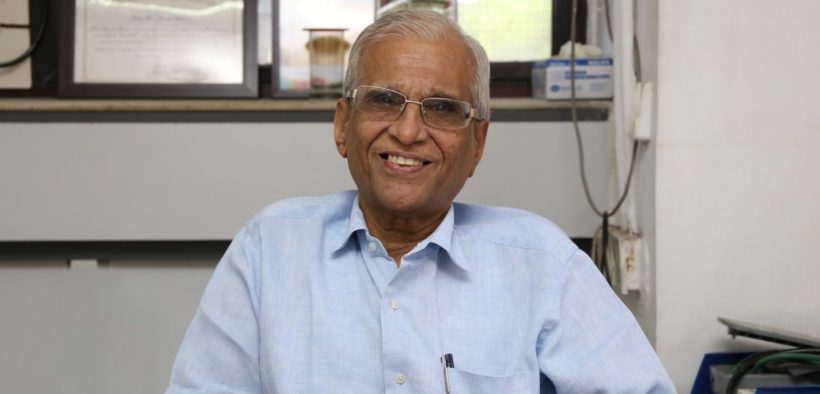There’s No Stopping Him

Times were very different back then. In the 70s, 50 per cent of those diagnosed with cancer would go back home knowing there was no treatment.
Dr Suresh Advani
It’s 7.30 pm and Dr. Suresh Advani is having a hurried lunch in his clinic in Chembur in central Mumbai, possibly his first meal of the day after breakfast at 9 in the morning. About 30 minutes away, at the SL Raheja Hospital in Bandra, a dozen patients, coming face-to-face with the big C for the first time or on the path of an unsettling treatment, wait patiently for their doctor to arrive. He should have been there at 6.30 pm and the minutes are ticking away but no one is hassled. At 7.50 pm, the elevator door opens to reveal the crinkled face of a wheelchair-bound man whose smile lights up the lobby. It’s no exaggeration. Dr. Advani is here and the elderly woman sitting next to me says out loud to no one in particular, “This man’s smile puts life back into everything!”
Padma Shri and Padma Bhushan awardee Dr. Suresh Advani has just celebrated his 69th birthday but neither his enthusiasm nor his energy seems to ebb. “It is my patients who keep me going. Yes, there have been some excellent teachers who have inspired me. My family – my parents, my wife and my children – have supported me throughout; especially my wife, herself a nurse, who understood every time a patient would turn up at home and I would have to keep unearthly hours at work,” says the sexagenarian. “But beyond all doubt, my patients and their confidence infuse this energy in me. They shower me with such wonderful words and keep me motivated always. Of course, every doctor knows that he is not God but when people say something simple like “I am alive today because of you” you believe that you are doing something of value. That will to keep doing good, doesn’t allow me to stop.”
As a young medical student at Grant Medical College, Dr. Advani didn’t have it easy, going by the account of his contemporaries. The reason was his handicapped status. Having been afflicted by polio, however, has hardly affected him. “I don’t think about it. I’d like to believe everything worked out well for me. I get the kind of respect that my work deserves,” he beams.
After completing his MD, Dr. Advani worked with Tata Memorial Hospital, which opened up the gates of this new field – oncology – for him. “Frankly no one was interested in the field at all. Medical oncology was non-existent, only surgical oncology was an option. So I think I got here by chance. I went on to study further in London and Seattle,” he reminisces. At the Fred Hutchinson Cancer Research Center in Seattle, he worked with Dr. E Donnall Thomas, the father of bone-marrow transplantation who won the Nobel Prize in medicine in 1990. Dr. Advani specialized in bone-marrow transplants and brought it to India, thus pioneering a change in the way cancer was treated in our country. He went on to become the first oncologist in India to successfully complete a bone-marrow transplant of a nine-year-old girl suffering from myeloid leukemia.
“Times were very different back then. In the 70s, 50 percent of those diagnosed with cancer would go back home knowing there was no treatment. The treatment was limited and the knowledge about the various types of cancers was also marginal,” he rues. “Nowadays, patients want to get treated. Their expectation has increased because they know that they can be cured. The treatment has become simpler and there are fewer side-effects. The fear and the dark feeling about cancer have decreased. It has started a positive chain reaction.”
Dr. Advani singles out the case of a young woman diagnosed with myeloid leukemia who came to him with high hopes of a revival. While treatment began in earnest, she did not respond favorably and developed an infection. She fell unconscious and her family who had gathered around thought it would be best if they took her home. “Even today I remember her husband’s face as he came to me one evening and told me he wanted to take her back immediately. I still don’t know what made me say it but I told him in these exact words, ‘What’s the hurry? Let’s wait till tomorrow morning’,” says Dr. Advani. Miraculously, the lady gained consciousness overnight and by next morning she started responding to the treatment. More than 10 years have passed since, and she is still going strong.
Ask him what his advice would be too young oncologists and he says, “Patients just want to see how confident you are and they want your patient ears. Listen to them and tell them exactly how you will go about their condition. They want those reassuring words. I never hide the truth from my patients. But I never paint a bleak picture either. Cancer is not all dark. There is hope, there is positivity. And that is what helps a patient overcome the biggest crisis of his/her life.”
It is 10 in the night, and while the rest of us are thinking of hitting the sack, Dr. Suresh’s seems to have only begun. Even in this late hour, he is one round and five hours away from bedtime as his patients at the next hospital, Jaslok, await his visit. Playing on his car stereo are his favorite songs, Ae Maalik Tere Bande Hum and Itni Shakti Humein Dena Datta as the doctor enjoys his few moments of me-time before going about working his magic
KNOW YOUR DOCTOR
Dr. Suresh Advani
Medical Oncologist
- Works at Jaslok Hospital, Mumbai
- Pioneered hematopoietic stem cell transplant in India
- A Padma Bhushan awardee, he has also received the Lifetime Achievement in Oncology from Harvard Medical International
















